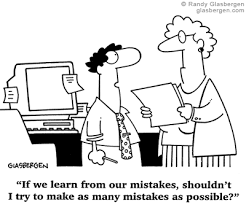Introduction
You give a presentation to a full house and suddenly you have lost your text. It’s a scenario that can keep most of us awake at night. We don’t like to make mistakes and if something goes wrong, it feels like failure. A shame, because as children we were already taught: you can learn from your mistakes.
At Google, they know better than anyone: making mistakes is important in order to innovate. That is why they annually award the prize for the biggest failure of the year at the mega-successful tech company. The purpose of this: to remove employees’ fear of trying new things, which is a good thing, right?
Your bosses do not accept mistakes? Get punished for the smallest failures? You might be at the wrong company, so check out my last paragraph for the way out.
New developments
The fact that mistakes lead to development seems to be a very open door. However, in practice, it is done very erratically. People are hesitant to make mistakes and feel the pressure to be perfect. When it comes to being competent, people mean: flawless. But we are all humans and you are going to make mistakes anyway. You are competent if you deal with your mistakes in the right manner.
What does that mean? It means that you should be mild, accepting, and open to failure. Do not punish yourself and others for mistakes and do not hide them, but put them on the agenda. A good example is the world of aviation. In that sector – without regard to persons – errors are investigated. This gives you a learning culture and partly because of this aviation has become so safe these days.
There is a general belief that we are usually too focused on a good performance. We focus on the end result while focusing on development is just as effective or even more. In addition, the latter makes you happier and less stressed. In other words: you flourish more.
Times changed
 The fact that performance has become so important has partly to do with a future that is less certain. For a long time, working life was quite manageable. If your father was a carpenter, then you became one too. And as a woman, the cards were already shuffled at birth: keeping the household and a family going became your life fulfillment. Those times have – fortunately – changed: there are many more options, but the downside is that you have to continuously show what you are worth. People get the feeling that they have to be sharp all the time. That they have to deliver continuously without making mistakes.
The fact that performance has become so important has partly to do with a future that is less certain. For a long time, working life was quite manageable. If your father was a carpenter, then you became one too. And as a woman, the cards were already shuffled at birth: keeping the household and a family going became your life fulfillment. Those times have – fortunately – changed: there are many more options, but the downside is that you have to continuously show what you are worth. People get the feeling that they have to be sharp all the time. That they have to deliver continuously without making mistakes.
Not possible
An impossible task, according to psychologists. “I wouldn’t know how people can work without making a single mistake. If you want that of yourself, you’ll get stuck and/or sick. You start playing it safe and the fun of your work is gone. Many companies nowadays require you to set goals. That in itself isn’t bad – they can help you progress in your work – but rather than performance goals, it should be more about learning goals.
So do not say: I want 20,000 more visitors to my site than last year. But instead: I’m going to investigate which topics are alive among the target group in order to attract more visitors. With performance goals, you will always go for a safe option, because you will be judged on the result.’
Also good for the organization
Daring to fail is not only good for your own development, but also for the organization. This leads to more innovative capacity and creativity, according to research. And let these be important capacities to remain relevant as an employee for the future. It has become increasingly important for employees to be agile. Changes follow each other in rapid succession. For a long time, the idea prevailed: you learn when you are young, but everything currently indicates that we must keep learning permanently. That should mean that you are allowed to make more mistakes, but unfortunately, the error tolerance has not grown with it.
employee for the future. It has become increasingly important for employees to be agile. Changes follow each other in rapid succession. For a long time, the idea prevailed: you learn when you are young, but everything currently indicates that we must keep learning permanently. That should mean that you are allowed to make more mistakes, but unfortunately, the error tolerance has not grown with it.
This is the case in a company where social safety is good. In a socially safe organization people dare to open their mouths, feedback is given, people listen to each other and mistakes are a natural part of learning and trying.
Compare your mistakes
Realize: mistakes are facts to which you attach a negative judgment. Sometimes that judgment is justified – we have certain norms and rules in society – but often it is also questionable whether it is a fair judgment. If you cut the judgment loose, all that remains is a fact. That helps to put things into perspective.
Training can help make people more successful in failure, such as the growth mindset: the belief that your ability to learn can grow. And skills from Acceptance and Commitment Training (ACT). With ACT, people learn, among other things, to take their critical thoughts less seriously and to recognize that they are disappointed with their mistakes or can be sad about them. This creates space to dare to do things in your work that are really important to you.
We should also teach people to change perspectives, for example. By making oneself ask: If a good friend had made this mistake, would I judge him as harshly as myself? Often the answer is: no. When people approach themselves with the same care, tolerance, and kindness that they would treat a dear friend, it helps to put things into perspective.
Which mistakes are good?
 Harvard professor Amy Edmondson also emphasizes the importance of making mistakes. She distinguishes three types of errors:
Harvard professor Amy Edmondson also emphasizes the importance of making mistakes. She distinguishes three types of errors:
- Simple failure: the mistakes you’d like to avoid. These types of errors arise during routine actions, for example, because the attention is slackened
- Complex failure: mistakes that are usually unavoidable, because the situation and the people involved are different every time. Think of an operation on a patient with a rare disease. Major blunders can usually be prevented in such a situation, Edmondson says, by being alert and immediately identifying and analyzing small mistakes.
- Intelligent failure: Deliberate failure because new territory needs to be explored. These are experiments where it is not yet clear what the right way is to do something. A process of trial and error is part of discovering this.
How does Edmondson think about dealing with these mistakes? Prevent simple failures as much as possible, identify and learn from complex mistakes and promote intelligent mistakes. Encourage employees to learn through experimenting.
Final thoughts
Making mistakes at work does not always have to be a bad thing. Failures can lead to better development, more creativity, and an extended innovative capacity. The company can benefit from making mistakes and good leadership should create a working environment where certain mistakes are tolerated and subject to discussion and learning.
At the same time, it is to be expected that many companies still will be result-oriented and mistakes cannot be accepted easily or not at all.
All of you have a choice, either you accept the punishment or you start preparing for a way out. In the latter case, I can help you by giving you the opportunity to start for yourself. Here is what you can do!
Internet marketing
The internet offers you many options, both good and bad (scams), but one of the most popular possibilities is to become an affiliate marketer. There are some pretty good programs to choose from, all scam-free and giving you a measure of success. I chose the one with the biggest chance of success, low investment, and working from home in your own time.
measure of success. I chose the one with the biggest chance of success, low investment, and working from home in your own time.
Think about creating a website within a very short period of time, the overall design is already taken care of. Then imagine writing content about one of your hobbies, helping people with their issues. Building out your site and getting a real audience, after which you are going to promote products to your customers.
You will do that by becoming an affiliate to a company that in turn will give you a computer link to their site and the product promoted by you. If sold, you will receive a commission. No need to purchase, hold stock or deliver, as the merchant will do that. This is affiliate marketing in short.
Introducing Wealthy Affiliate (WA)
One thing is for sure: you cannot do all this by yourself, so you need professional help. Meet the world’s best internet business support company WA: excellent training, awesome support 24/7, a very helpful community, and very reasonable membership pricing.
WA was established in 2005 and I joined in late 2014 and never looked back. As you will have a lot of questions, I have prepared a full review of this unique opportunity. You can access it by clicking here and read all about this program. The review also contains a link with which you can become a member for one whole week for completely free, with no commitments!
Thanks for your attention and please do ask your questions through the comment section below.


Wow I have got to say Jerry! This was just so spot on! Enjoyable read! So much to learn from it. Thank you so much for sharing this. Glad I read this. Now I will feel more comfortable taking those creative ideas(risk) that comes to mind, those I shove off normally!. This means one have to stop thinking about what others think, yes! the worse that could happen is a mistake!. And yea.. I have spent a few months learning about Affiliate marketing Already through WA. Its been a great experience
You make a good point as to how your colleagues would be seeing your mistake, which could be a contributing factor to your misery. Then it becomes all the more important for your leadership to create a working atmosphere where mistakes are allowed. Not laughed about, but discussed to ultimately become better as individuals and thus as a company.
Hi Jerry
Thanks for sharing your thoughts on making wilful mistakes at the workplace to ultimately improve the overall working and exploring new territories. It was nice to know that Google even award annually for the biggest mistakes as it opens up the path for innovation. The attitude to do anything to achieve the objectives of organization and making few mistakes on the way so there is continuous improvement is ultimately good.
Warm Regards,
Gaurav Gaur
I am not sure about the definition of wilful mistakes, but we should not intentionally make mistakes. Continuous improvement should be the goal for any company and learning from previous mistakes is one of the ways to achieve this.